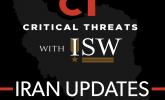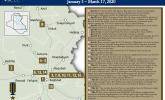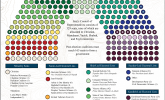Iran Update, March 30, 2023
March 30, 2023 - ISW Press
Iran and its proxies may target US forces in Syria in retaliation for multiple Israeli airstrikes on Iranian and Iranian-backed forces in Syria on March 30. Israel Defense Forces (IDF) conducted two airstrikes targeting a likely Iranian or proxy officer and an Iranian-backed militant facility near Damascus on March 30. Syrian media reported that the first airstrike targeted a “pro-Iranian” foreigner traveling in the vicinity of a possible Iranian air defense site, suggesting that the target was an individual of some significance to the Iranian project in Syria. CTP previously reported that the IDF likely targeted an IRGC Quds Force facility and headquarters in the same general area on February 18, indicating that senior Iranian and proxy officers are present there. Iranian leadership has previously warned that it holds the US accountable for Israeli airstrikes in Syria, and Iranian proxies have attacked US positions on several occasions in retaliation for such airstrikes, including the March 23 drone attack that killed an American contractor in northeastern Syria.







